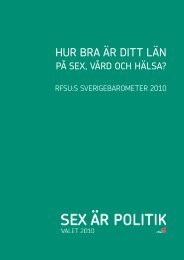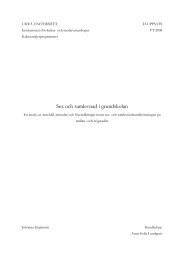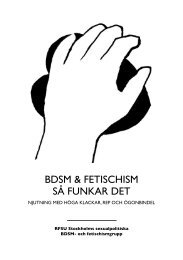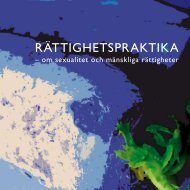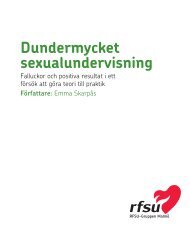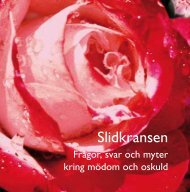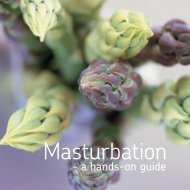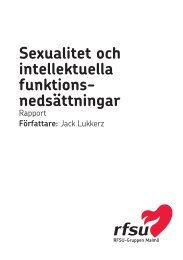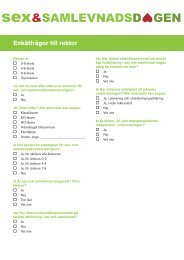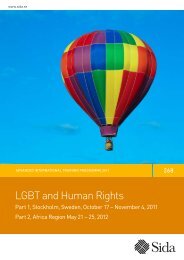Download pdf - RFSU
Download pdf - RFSU
Download pdf - RFSU
Create successful ePaper yourself
Turn your PDF publications into a flip-book with our unique Google optimized e-Paper software.
Psychotherapeutic work is voluntary, and based on<br />
trust and a desire to understand oneself better. Having<br />
such contacts regularly over an extended period of time<br />
can lead to a deeper understanding one’s own life and<br />
motives, along with the workings of conscious and most<br />
especially unconscious factors. This is a strength of the<br />
psychotherapeutic approach something that makes it<br />
distinct from other ways of gathering information.<br />
The forms of psychotherapy that were offered in our<br />
work were group psychotherapy and individual psychodynamic<br />
psychotherapy. Some of the clinic’s psychotherapists<br />
have extensive experience in working with men in groups.<br />
These experiences have proven very positive and initial<br />
treatment results have been good. Therefore, it seemed<br />
natural to offer the men primarily group therapy. Similar<br />
experiences of working with women in a group did not<br />
exist at the clinic; they were therefore offered individual<br />
psychotherapeutic contacts. Since the overall goal was to<br />
gather relevant clinical experience and knowledge, we did<br />
not consider it a problem that the form of treatment differed<br />
for women and men.<br />
In order to better reflect on the material gathered from<br />
these contacts, we used several tools and instruments of<br />
investigation.<br />
Systematic reflections of the<br />
psychotherapeutic contacts<br />
Supervision: The psychotherapists have had continuous<br />
supervision with psychoanalytical orientation in two<br />
different supervision groups, one for those working with<br />
men and one for those working with women. Supervision<br />
has been process oriented, but has also attempted to stimulate<br />
understanding of the nature of client’s difficulties in<br />
a more general sense.<br />
Conferences and interviews: A whole day conference<br />
was held each term. The clinical experiences in working<br />
with each group of clients was compared and discussed,<br />
and relevant literature has also been read to aid reflective<br />
work. However, these conferences proved inadequate<br />
for discussing all relevant questions that surfaced in the<br />
clinical contacts. We therefore supplemented our work<br />
with interviews in which both groups of psychotherapists<br />
interviewed each other, in order to engender a better understanding<br />
for the other’s work and findings. From these<br />
interviews an attempt was made to systemise clinical experiences<br />
and a number of hypothesis were formulated.<br />
International exchange: In order to guide and stimulate<br />
our work visits to The Portman Clinic in London were<br />
organised. The Portman has a long tradition of working<br />
with sexual problems from a psychoanalytical view, and<br />
the visits helped us to reflect on our work.<br />
Investigational instrument<br />
Journal Template: A journal template was created in<br />
order to collect important facts about clients’ background<br />
in reference to circumstances of childhood, traumatic<br />
experiences and so on. It was also used to summarise<br />
the course of each contact, for example the number of<br />
cancelled visits, failure to attend, etc. Templates were<br />
completed at the end of each contact by the therapist.<br />
Templates were used to help describe general clinical<br />
experiences and formulate new questions.<br />
Follow up with CHAP: All psychotherapists were<br />
trained in using “Change After Psychotherapy (CHAP),<br />
developed by Sandell (1993). CHAP is a method for measuring<br />
the effect and the experienced qualitative change<br />
of psychotherapy. It is built on the patient’s subjective<br />
9



